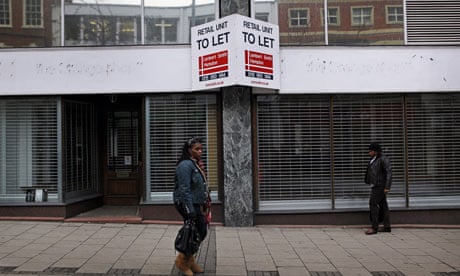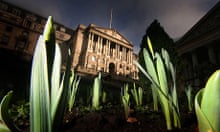The British economy shrank at the fastest rate in 30 years in the first three months of this year, raising fresh doubts over Alistair Darling's budget forecasts just 48 hours after they were announced.
Official figures released this morning showed gross domestic product (GDP) fell by 1.9% between January and March. This is the sharpest quarterly decline since the third quarter of 1979, the year when Margaret Thatcher came to power.
The fall was far worse than the 1.5% decline forecast by City economists. It contradicts the chancellor's claim on Wednesday that the economy shrank "by a similar amount" to the fourth quarter, when it contracted by 1.6%.
The Conservatives were quick to launch a fresh attack on Darling. The shadow chancellor, George Osborne, said: "Just two days ago, the chancellor said his figures for this quarter would be similar to the last quarter – in fact they are worse. This is worrying as it means the recession will be deeper and people will suffer more. This budget has unravelled quicker then any in living memory as we discover a secret tax bombshell, hidden spending cuts and fantasy forecasts on which the government's whole plan for recovery is based."
Analysts were equally critical. ING economist James Knightley said: "Today's GDP report again highlights how optimistic Darling was in his budget assumptions and that the risk to the fiscal deficit remains heavily to the upside."
The downturn is forcing the chancellor to borrow £175bn this year.
The data from the Office for National Statistics (ONS) revealed that economic output in the first quarter was 4.1% less than a year ago, the worst annual decline since the end of 1980.
James Hughes, the chief investment officer at Black Swan Capital wealth management, said the UK economy was "very clearly in serious, serious trouble", with more pain to come.
"Our research suggests that the latter stages of this crisis will be characterised by rapidly escalating inflation and further weakening of sterling, much like the stagflation of the 1970s. The chancellor's forecasts in the budget are now looking even more out of touch," said Hughes.
Darling confirmed on Wednesday that the UK was in the grip of the deepest recession since the second world war as he slashed his GDP forecast for this year to a decline of 3.5%. But he surprised economists by predicting a rapid recovery, saying that the economy would return to growth towards the end of the year and expand by 1.25% in 2010 and by 3.5% in 2011 and the following years. Many analysts believe this is wildly optimistic. The average forecast is for growth of just 0.3% next year.
Yvette Cooper, the chief secretary to the Treasury, said this morning that the government stood by its forecast that the recovery would begin at the end of 2009.
Gloomy views
The breakdown of today's numbers made grim reading. Manufacturing slumped by 6.2% on the quarter, its worst performance since records began in 1948, and overall industrial production including utilities and mining was down 5.5%. The dominant service industries declined by 1.2%, the sharpest fall since 1979, with the financial sector particularly weak.
The Centre for Economics and Business Research calculated today that the economy would contract by at least 4% this year, which would be the largest slide since 1931. The thinktank's economist Benjamin Williamson said: "A contraction of only 3.5% this year as outlined in the budget on Wednesday seems now to be wishful thinking from the chancellor."
The International Monetary Fund takes a similarly gloomy view. It warned two days ago that Britain would be stuck in recession for another year as consumers, reeling from the housing crash, cut spending. The organisation predicted a 4.1% slump for the UK this year and a further 0.4% contraction next year.
However, the IMF backed Darling's claim that Britain would suffer less than other major economies, including Germany and Japan.
The CBI business organisation said today's GDP data showed "how grim the last three months have been". Its deputy-director general, John Cridland, said: "Looking ahead, the best we can say is that the pace of economic decline may slow in the coming months. Given that unemployment will continue rising sharply, even if businesses begin to see the rate of decline in activity starting to ease, consumers are likely to feel anxious about job prospects."
Industry is suffering severely after world trade collapsed, with carmakers hit particularly hard. Industry figures out today showed that the number of new cars produced in the UK fell by more than half in March from a year ago. The 51.3% drop was slightly better than February's record decline of 59%, according to the Society of Motor Manufacturers and Traders. Many manufacturers have moved to shorter working hours or even suspended production.
Sterling came under pressure even before the GDP figures were released, dropping by over 1% against the euro to €1.1062 this morning on fears that the UK may lose its triple-A credit rating because of the scale of public debt outlined in the budget - with Darling forecasting it will reach 79% of GDP by 2013.
A downgrade would make it more expensive for the government to borrow money by selling bonds, potentially leading to further tax rises or cuts in spending.
But Moody's, the ratings agency, said this morning that the UK's AAA rating was "stable, not under review".
There is some optimism that the worst of the slump may now be behind us.
Colin Ellis, European economist at Daiwa Securities, said: "Today's data are undoubtedly bad, and could serve as a rude awakening to anyone who had started dreaming of an eventual recovery (stand up, Mr Brown). Despite this, the marked size of the fall could even end up bolstering hopes that further cuts in output may be less pronounced - because if so much of the adjustment in the economy has already come through, maybe less is required going forwards."


Comments (…)
Sign in or create your Guardian account to join the discussion